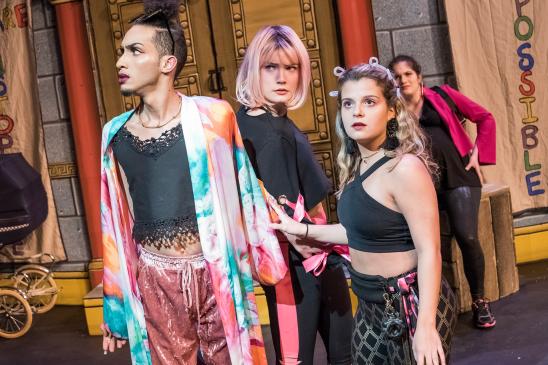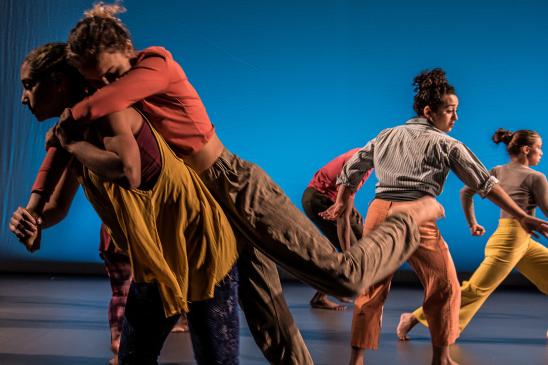Why Tufts for Theatre, Dance, and Performance Studies?
- We believe that close and ongoing mentorship is fundamental to students' experience in the arts at Tufts.
- We see our undergraduate classes as integral to our creative processes. We see coursework and production and intricately and fundamentally connected.
- We have a commitment to offering courses that examine how diversity and inclusivity enrich our community, and we invite students to think about how their coursework engages with social justice issues.
- The breadth and depth of coursework that we offer in the Department of Theatre, Dance, and Performance Studies offers students new opportunities to engage with all different areas in the arts.
Theatre and Performance Studies
Our students often use their Tufts experience in Theatre and Performance Studies as a springboard into professional training and careers. Noteworthy alumni in theatre and film include Hank Azaria, Judy Bowman, David Costabile, Peter Gallagher, ML Geiger, Molly Glynn, William Hurt, Nick Jandl, Kristen Lee Kelly, James Nicola, Robert O'Hara, Joel Perez, and Oliver Platt.
In recent years, our undergraduates have gone on to exciting work in the professional theatre, including the Department of Cultural Affairs in New York City, starting their own theatre companies, launching their own casting agencies, working with theatrical agents such as Samuel French, performing at Playwrights Horizons, Cleveland Playhouse, Berkeley Rep, or at other theatres in cities across the United States. Others have pursued opportunities in film and television out in Los Angeles. Some of our students pursue advanced training after their time at Tufts. Over the past decade, seniors have gained admission to prestigious graduate programs at the Yale School of Drama, Columbia University, the Juilliard School, NYU's Tisch School for the Arts, Northwestern University, and the Webber-Douglas Academy (London), among others.
While many of our undergraduate alumni have successful careers in some aspect of theatre, film, or television, still others have made productive transitions to law, business, advertising, education, and many other fields.
Dance at Tufts
Dance offers a unique partnership between the body, mind and its aesthetic expression. It invites collaboration and social interaction. It engages in an inherently interdisciplinary process and partners with the fields of anatomy, kinesiology, sports medicine, somatics, music, drama, visual arts and aesthetics. Dance permeates the fields of arts education, creative arts therapies, art history and criticism, cultural anthropology, sociology, arts business, commerce and administration.
Dance exposes students to physical, creative and aesthetic concerns that challenge and expand creative and intellectual vision. At all levels of study, dance embraces the following areas of skill and knowledge:
- Physical Skill (movement range, flexibility, strength, endurance, speed, core integration, memory).
- Physical Self-Knowledge (a body/mind relationship that promotes life-long health and well being).
- Movement Literacy (visual recognition and familiarity with movement principles and vocabulary).
- Creative Problem-Solving Skills (an ability to translate ideas into tangible actions and physical solutions).
- Self-Directed Learning (independent identification, discernment and application of movement choices and their meaning and consequence).
- Critical Thinking (ability to discern appropriate application of movement choices and principles in the execution of individual and group movement situations and projects).
- Reflective Creative/Research Practice (critical thinking employed in research and creative modes.
- Inter-Personal Skills (moving in relationship to another individual either in harmony or in counterpoint, in close proximity or in specific spatial relationship, involves being able to negotiate personal and cultural non-verbal similarities and differences via one to one engagement).
- Collaborative Skills (negotiation, experimentation, translation and transformation of ideas as a member of a group)
- An Ability to Assume a Leadership Role (using inter-disciplinary skills and creative thinking in the conception and execution of a movement idea as realized by a group of people).
- Inter-Disciplinary Awareness (recognition and engagement with the fields of science, arts, social sciences and business).
- Access to the World Cultural Community (exposure to the scope and variety of dance as an art form and its numerous manifestations across the globe)

